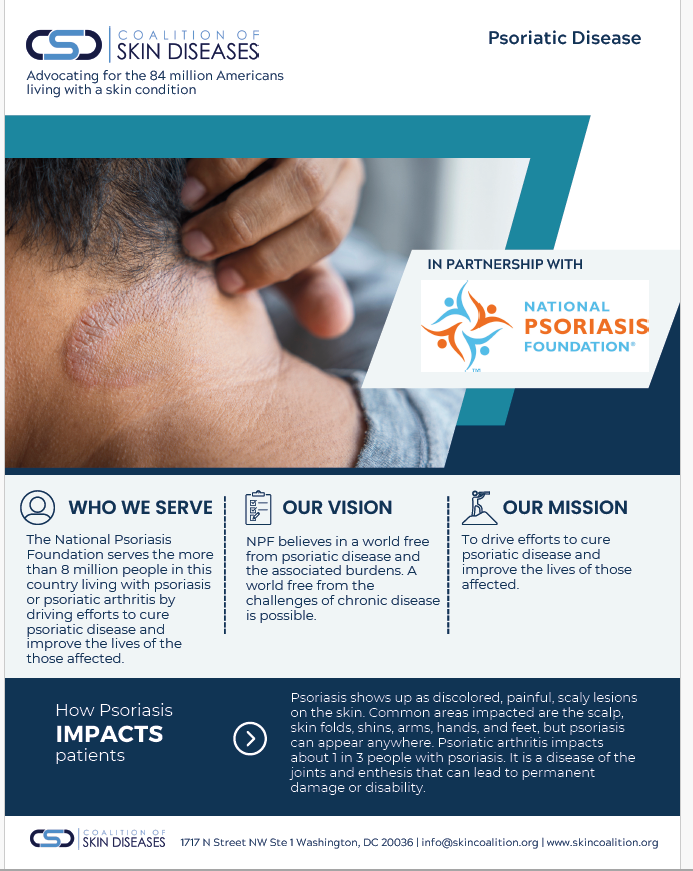Psoriasis is a chronic immune-mediated disease, which according to the Journal of Psoriasis and Psoriatic Arthritis, is a disease with an unclear cause that is characterized by inflammation caused by dysfunction of the immune system. Psoriasis is associated with systemic (body wide) inflammation. There may be visible signs of the inflammation such as raised plaques (plaques may look different for different skin types) and scales on the skin.
Inflammation caused by psoriasis can impact other organs and tissues in the body. People with psoriasis may also experience other health conditions. One in three people with psoriasis may also develop psoriatic arthritis (PsA). Psoriasis and PsA are known together as psoriatic disease.
Psoriasis has impacts throughout the body. The skin symptoms occur because the overactive immune system speeds up skin cell growth. Normal skin cells completely grow and shed (fall off) in a month. With psoriasis, skin cells do this in only three or four days. Instead of shedding, the skin cells pile up on the surface of the skin. Some people report that psoriasis plaques itch, burn, and sting.
Psoriasis can appear anywhere on the body, even on the eyelids, ears, lips, skin folds, hands, feet, and nails. Plaques are commonly found on the elbows, knees, and scalp. Plaques can be a few small patches or can affect large areas. It’s possible to have psoriasis plaques and scales in more than one location on the body at a time.
There are five types of psoriasis. It’s possible to have more than one type of psoriasis at one time and more than one type in a lifetime. Treatments may vary depending on the type and location of the psoriasis.
Psoriasis treatments aren’t one-size-fits-all, and that’s a good thing. It means that you can work with your health care provider to find the right psoriasis treatment or combination of psoriasis treatments for you. Treatment can reduce or eliminate your symptoms.
Topical treatments are applied to the skin and are often the first treatment recommended to a newly diagnosed person. Topicals can be purchased over the counter or by prescription.
Phototherapy, or light therapy, involves exposing the skin to ultraviolet light on a regular basis under medical supervision. Phototherapy is administered in a health care provider’s office, clinic, or at home with a phototherapy unit.
Systemic treatments – both oral systemics as well as biologics – are prescription drugs that are taken orally, by injection or by infusion and work throughout the body. Systemics are typically prescribed for moderate-to-severe psoriasis and psoriatic arthritis.
Complementary and integrative medicine is a group of diverse medical and health care systems, practices, and products that are not presently considered to be part of conventional, or Western, medicine.
NPF was founded in 1967 by Beverly Foster, who was looking for community and improved treatment options. For 55 years, NPF has supported all those impacted by psoriasis with education, information, advocacy, and research efforts. The mission of NPF is to drive efforts to cure psoriatic disease and improve the lives of those affected.
NPF is the largest nonprofit funder of psoriatic disease research in the world.
Each year, the NPF Patient Navigation Center helps nearly 20,000 people access their care, navigate insurance obstacles, and learn about psoriatic disease.
NPF Resources
NPF is the trusted source of all information related to psoriatic disease. Through NPF Advance magazine, psoriasis.org, the Journal of Psoriasis and Psoriatic Arthritis, and the Psound Bytes™ Podcast, the NPF community stays informed on the latest tips, treatment options, personal stories, and more.
All those impacted by psoriatic disease, including caretakers and health care providers, have access to free resources through psoriasis.org and the NPF Patient Navigation Center.
For additional information, visit psoriasis.org
Instagram: @national.psoriasis.foundation
Facebook: @national.psoriasis.foundation
Twitter: @NPF

Connect with your federal legislators to speak up for dermatological conditions today.